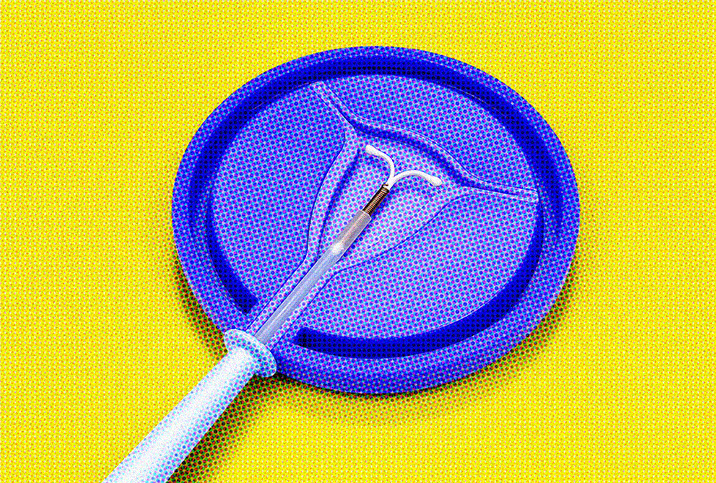Key Questions to Ask Your Doctor About Your Contraceptive Options

Contraception. Just the word alone can bring any number of stresses, questions and concerns bubbling to the forefront of your mind. For one, a vast number of birth control options are available; staring at a list of items you can swallow, implant into your arm or insert into your vagina can make the head start to spin (and the stomach clench, if you're squeamish).
Then there's the fact that each of these contraceptive options affect the body differently. Plus, contraception can be a difficult topic to talk about with a healthcare provider: "I've just started having sex with a new partner and I really don't want to get pregnant. What do you recommend?" doesn't always roll off the tongue, as much as we wish it did.
Luckily, though, there are some key questions you can ask your doctor about your contraceptive options—questions that significantly strengthen your chances of getting the birth control that's best for you and your body, and ensure you feel comfortable and confident enough to get every last concern off your chest.
The types of available contraception
According to Erica Montes, M.D., a Phoenix-based, board-certified OB-GYN, Organon spokesperson and founder of "The Modern Mujer" health blog, contraception options can be split into three categories:
- Short-acting options, such as pills, patches, vaginal rings and injections
- Long-acting reversible contraception (LARC), including intrauterine devices (IUDs) and implants
- Permanent options, such as sterilization
"Short-acting contraceptives can be taken orally, placed on your skin, inserted into your vagina or taken in the form of an injection from a healthcare provider," Montes said. "These options can be taken daily, weekly, monthly or every three months. You can stop using these methods at any time.
"Long-acting reversible contraception is placed inside your body either in your uterus or arm by a healthcare provider and can be used for multiple years," Montes continued. "You can stop using these methods at any time and the removal should be performed by a doctor or healthcare provider."
Permanent options don't tend to be easily reversible because the fallopian tubes are blocked or removed via surgery, Montes explained.
Choosing the right contraception method
If you're feeling overwhelmed by all the options available, that's totally normal, particularly when you take patient individuality into account. Each body has different needs from—and responses to—contraception.
"There is no 'best' birth control, because each person has specific needs, preferences and biology that make some options better than others," said Lyndsey Harper, M.D., a Dallas-based, board-certified OB-GYN, founder and CEO of Rosy Wellness, a sexual wellness platform, and medical advisor at the Body Agency, a source for feminine care.
"Many factors go into choosing the right form of contraception, including the presence of any medical conditions like high blood pressure, blood clots or a seizure disorder, mental health considerations, plans for future pregnancy, history of side effects on birth control and personal preferences," Harper continued.
When working with patients, Montes said she considers effectiveness, safety profile, availability, cost, frequency of administration and more.
"I usually start by asking my patients what methods they've heard about, or are interested in, to begin the conversation," she added.
That's the key: conversation. Any conversation with a doctor around contraceptive options should always feature questions—questions from the doctor to establish key factors such as health background, and questions from you, too, to ensure you're able to select the best possible birth control for you and your body.
Questions to ask your doctor
Montes suggested starting off with the most practical questions:
- What are the different birth control options?
- How does each method work to prevent pregnancy?
- What are the risks associated with each method and what can I expect?
- What is covered under my insurance?
- Should I consider a daily or nondaily contraceptive method?
"Some things to consider [are] what is the efficacy of the method, both perfect use and typical use?" added Sara Twogood, M.D., a board-certified OB-GYN in Los Angeles and co-founder of Female Health Education and the online magazine Female Health Collective.
Additional questions Twogood recommended asking include:
- How do you take this form of birth control?
- Do you have to remember to take a pill every day?
- Do you have to remember "in the heat of the moment"?
- Are there any side effects?
- Are there any medical contraindications? For example, some people with migraine headaches should not take estrogen. Do you need protection against sexually transmitted infections?
Cost and insurance coverage are important details to consider, as well, Twogood said. She suggested establishing a baseline health status—and a baseline period status—with your healthcare provider.
"For example, if your periods are very heavy, then using the copper IUD, which can make bleeding even heavier, may not be the best choice," Twogood said.
Harper suggested further questions that would be beneficial to ask a doctor, including:
- Does this type of birth control provide positive benefits in addition to contraception?
- How might my other medical, mental health or sexual conditions be affected?
- What type of contraception is best if I'm planning a pregnancy in a month, a year, five years or never?
How to feel confident and empowered during these talks
"It's really common to be nervous or even embarrassed to talk about sex and contraception, but an open conversation is exactly what we all need," Harper said.
"Any time we introduce something new to our schedule, our bodies and our lives overall, it can be intimidating," she continued. "The best way to approach contraception is to educate yourself about the different options and discuss your questions and concerns with your provider. An open line of communication is essential in order to feel confident about your initial choices, as well as to continue to work through any side effects that may come up after the decision is made."
Montes echoed this advice.
"I know talking about sexual and reproductive health can sometimes be uncomfortable, [so] it's important to find a doctor you are comfortable with," she said.
You can ease yourself into conversations about birth control by talking to friends and family members about what they like and don't like about their methods, Twogood added. You can also switch to a different form of contraception if what you're using isn't working for your needs and your body.
The main goals are to know which birth control options are out there and which questions you should ask your doctor, and to feel empowered as you do so. Contraception should be available to anyone who wants it, so don't let uncertainty or embarrassment stand in your way. Doctors have heard it all, Montes noted, and every question you have is valid.


















